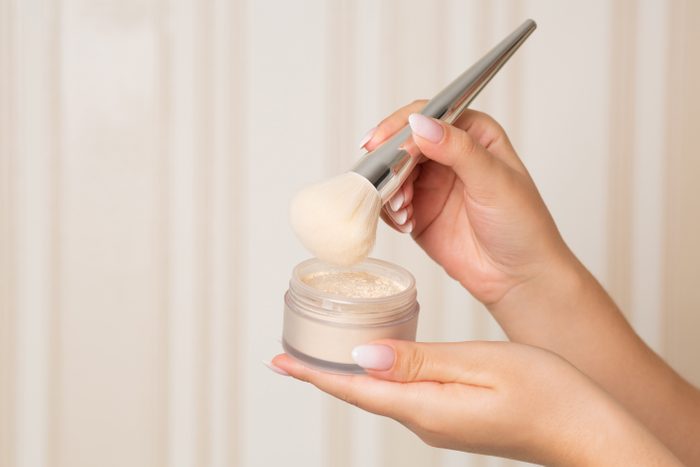Why You Might Want to Stop Using Beauty Products With Talc—Even Before Its Potential Ban

Here’s the low-down on what the restrictions mean for you, and what kinds of health risks are associated with talc.
In April 2021, the Canadian government announced that they are exploring the possibility of restricting the use of talc, a commonly found mineral, in cosmetics and self-care products. This announcement came as a result of their final health and environmental impact assessment of talc, which found that the mineral might be harmful to your lungs when it’s inhaled and its inclusion in vaginal hygiene items may be linked to ovarian cancer.
Here’s what to know about talc and Canada’s potential new restrictions.
(Related: What You Need to Know Before Taking Biotin Supplements)
What is talc, and what products contain it?
Talc, or hydrated magnesium silicate, is a clay mineral that’s found in a large range of everyday products. It’s the softest mineral on the planet, and it’s often added to cosmetics and self-care products to dilute the pigment or give it that soft, silky texture we love. While talc generally isn’t a concern to human health (and it’s safely used in things like paint, paper, plastics, ceramics and even food additives), it can be dangerous when inhaled or used in the genital area. These new restrictions target talc in self-care products like cosmetics, natural health products and genital care products.
(Related: 9 Common Skin-Care Ingredients That Are Making You Break Out)
What are the health risks associated with talc?
Health Canada’s assessment found that while most uses of talc are safe, and it’s safe for the environment, there are some serious potential health risks when it’s used in particular products.
First, inhaling talc can lead to lung function disorders. According to Health Canada’s evaluation, because talc particles are persistent (meaning they stay in your body and don’t break down), they can accumulate in your lungs, which leads to a reduced ability to fight infections, inflammatory changes and fibrosis. So, if you use a lot of products that contain talc, and you’re likely to inhale as you’re using it (think things like loose face powder, baby powder, or any other body powder), you may be at risk of talc accumulating in your lungs.
On top of the potential risks associated with lung health, using talc in your genital area might cause ovarian cancer. The theory here, according to Health Canada, is that using products that contain talc on the exterior part of your vagina might lead to talc particles migrating to your ovaries and causing tumors. Products that Health Canada are investigating, and potentially banning, include baby wipes, baby powder, body powder, diaper and rash creams, bath bombs, bubble bath products and genital deodorants that contain talc.
(Related: How Safe Is Permanent Makeup?)
What are the new restrictions?
Because of the emerging evidence surrounding these health risks, Health Canada is proposing expanded restrictions on the use of talc in cosmetics, health products and over-the-counter treatments that can be inhaled or used in the vaginal area.
In 2007, Health Canada mandated that warning labels be added to powder-based products containing talc that are meant for children and babies (like, baby powder). The new restrictions that are being proposed now won’t limit the amount of talc in products but will instead expand the use of warning labels to all products that contain talc that can be inhaled and/or come in contact with genitals — not just products for kids. At this moment, it’s unsure what other measures Health Canada is exploring when it comes to talc, aside from mandating warning labels.
These restrictions aren’t in place yet, and there’s no set timeline—Health Canada is still taking comments and feedback from Canadians until June 23.
So, is there anything I can do to mitigate my risk?
All cosmetics, natural health products and non-prescription drugs in Canada require a full ingredients list on the product’s label. So, the next time you’re shopping for a new loose face powder, you can steer clear of talc by checking the labels.
Next, this is what you need to know about biotin before taking supplements.




